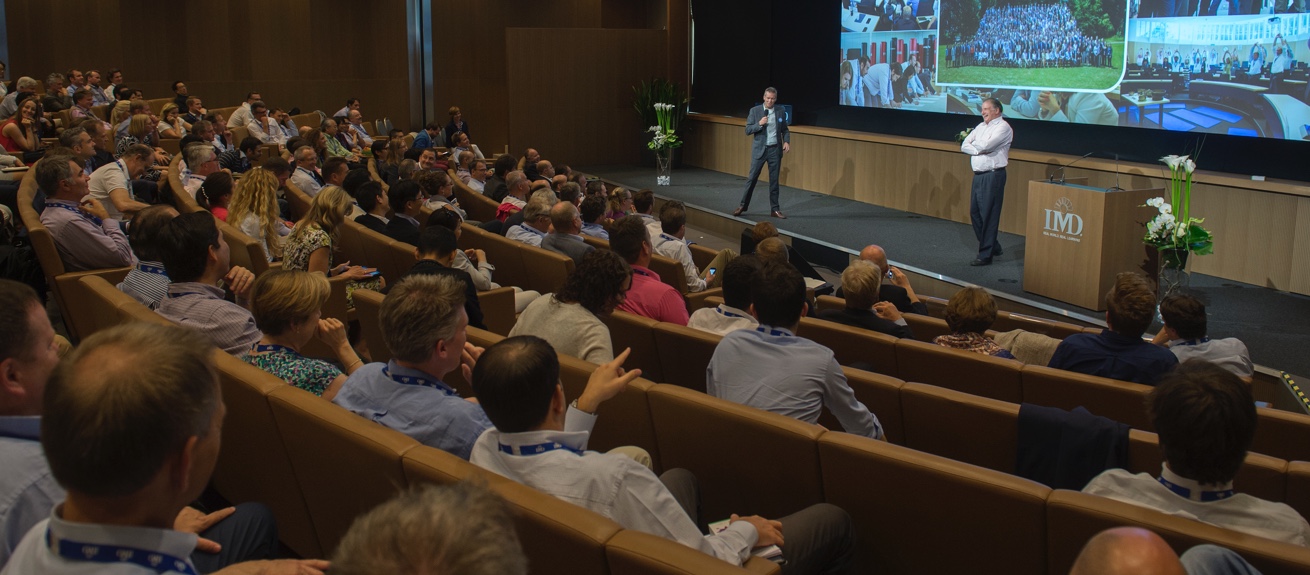
Not everything is just about business. But business, as viewed by IMD’s MBA program, has the potential to make a huge impact on the world’s wellbeing when taken with responsibility. Of the fields where business may impact our livelihoods most, healthcare and pharmaceuticals are extremely important. IMD alumnus Rainer Böhm, Chief Commercial and Medical Affairs Officer at Novartis Pharma addressed IMD’s MBA class of 2016 with his thoughts on the evolution of the pharmaceutical industry and leadership development.
A medical doctor with a business degree, Böhm has been with Novartis since 1988 and has held roles of increasing responsibility, including Head of the Oncology business in the US and Canada for ten years and, more recently, Head of Region AMAC (Asia-Pacific, Middle East and African Countries).
He spoke of the radical changes introduced by the internet and how healthcare will be machine-driven in the future. But first, he explained how Novartis maintains its position as one of the top pharmaceutical corporations in the world.
“We have a clear focus and that focus is to discover new ways to improve and extend people’s lives.”
Expertise and innovation
Healthcare is a growth market, he explained. On the one hand, the world population is growing, people live longer and an emerging middle class has greater purchasing power. On the other, chronic diseases are on the rise, as are high profile infections from ‘ecological niches’ as distances shrink.
The pharmaceutical industry is a competitive environment, he pointed out, and what ultimately determines the success of a company are the number of breakthroughs it can uncover.
“We must maintain the flow of innovation,” he said, adding that Novartis has the largest R&D department in the world with 6’000 scientists, researchers and business associates working on the molecular cause of diseases.
But to reduce the high number of projects in the pipeline, many of which never make it into the market, the company is learning to focus on what they do best. This sometimes means selling off a molecule that doesn’t fit the specific areas in which they have the lead and building, instead, strategic alliances.
The areas in which Novartis now concentrates have recently been reduced in a major structural overhaul. From a linear model under the former CEO, Danial Vasella, with six individual business units that worked like a holding, Novartis has evolved into a more complex corporation under Joseph Jimenez that cross-divisions across three key areas: pharma, eye care and generics.
“These are the three divisions where we can be world leaders because we have the expertise to stay on top.”
Furthermore, the new organization centralizes the manufacturing operations and improves capacity planning, thereby lowering the costs. Many divisions, Böhm pointed out, make the same kinds of products.
In turn, this will allow greater investment towards the customer, better training of physicians and more support for surgeons: “We are moving to a very different management of diseases and to solutions that go beyond the pill.”
Positive leadership
To define the kind of leadership that suits an evolving corporation, Böhm spoke of his admiration for Nelson Mandela. “Ambitious and humble is the leadership credo that he embodied.”
Mandela had an extremely high ambition to bring his country together, but he was humble in pursuing his goal, not seeking to put himself forward, but favoring dialogue and open-mindedness instead.
“I believe in the power of positive leadership,” Böhm said. In order for leaders to be successful, they must be authentic and inspirational: “Ask yourself what you want to be remembered for and take action now,” he recommended.
He also believes that admitting to failures and vulnerabilities can be a good team building exercise because it creates a strong bond between people and instills trust.
Böhm then described careers as climbing a mountain road with straight stretches, where you get better at your job, and curves where you have to slow down. These are moments to reflect on whether you have the right toolkit and skills to be a good leader.
“Going too rapidly can lead to failure,” he warned.
The great game-changer
Within the next 20 years, healthcare will be transformed by the internet Böhm predicts. Giving a specific example, he marveled at how contact lenses can now measure the amount of sugar in tears to alert diabetics to the amount of sugar they have in their blood, since the two are the same. A micro antenna in the contact lenses sends the relevant information onto a computer or smartphone for action to be taken.
Böhm suggested that the role of medical doctors will shift from deciders to advisors as healthcare becomes more and more machine-driven. He sees a future filled with value-based solutions: “We don’t sell pills, we sell an outcome.” As resources are finite, systems will adapt by becoming more agile and efficient.
“We have to take bets early on with technological companies,” he acknowledged.
Asked what he took away from Rainer Böhm’s presentation, MBA candidate Alistair Esfahanizadeh said that he appreciated leaders who move with new trends to build novel partnerships.
“It’s all about data,” he conceded, “and about creating a framework to let the market play.”
Learn more about IMD’s MBA program.


